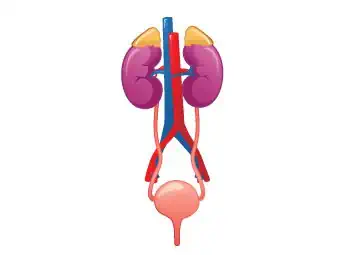Kidney stones can develop when certain substances in the urine — such as calcium, oxalate, and uric acid — crystallize and form solid masses. Several factors increase the risk of developing kidney stones.
Understanding these risk factors can help in implementing preventive measures:
Risk Factors for Kidney Stones:
- Family History: If someone in your family has had kidney stones, you are more likely to develop them too, suggesting a genetic predisposition.
- Dehydration: Not drinking enough fluids can lead to concentrated urine, which increases the risk of stone formation. Staying hydrated dilutes the urine and helps prevent crystals from forming.
- Dietary Factors:
- High Oxalate Intake: Foods like spinach, rhubarb, nuts, and chocolate contain high levels of oxalate, which can contribute to stone formation.
- High Protein Diet: Consuming too much animal protein, such as meat and fish, can increase uric acid levels and potentially lead to uric acid stones.
- Sodium (Salt) Intake: A high-sodium diet can increase calcium levels in the urine, promoting the formation of calcium stones.
4. Obesity: Being overweight can increase the risk of kidney stones due to changes in metabolism and increased urinary excretion of calcium and uric acid.
5. Certain Medical Conditions:
- Hyperparathyroidism: Overactive parathyroid glands can lead to higher calcium levels in the blood and urine, increasing the risk of calcium stones.
- Gout: A condition characterized by elevated levels of uric acid in the blood, which can lead to uric acid stones.
6. Digestive Diseases and Surgery: Conditions like inflammatory bowel disease or surgeries that affect the digestive tract can alter how nutrients are absorbed, potentially leading to higher oxalate levels in the urine.
7. Medications: Certain medications, including diuretics (water pills), antacids containing calcium, and medications that suppress the immune system, can increase the risk of kidney stone formation.
Prevention Strategies:
- Stay Hydrated: Drink plenty of water throughout the day to dilute urine and reduce the risk of crystals forming. Aim for at least 8 glasses (64 ounces) of water daily, or more if you live in a hot climate or exercise vigorously.
- Modify Your Diet:
- Limit Oxalate-Rich Foods: If you are prone to calcium oxalate stones, consider reducing intake of foods high in oxalate.
- Moderate Protein Intake: Balance your protein intake between animal and plant sources to avoid excessive purines (which break down into uric acid).
3. Reduce Sodium Intake: Aim to consume less than 2,300 milligrams of sodium per day (equivalent to about 1 teaspoon of salt). This helps prevent calcium from being excreted into the urine.
4. Eat a Balanced Diet: Include foods rich in calcium but moderate in protein and sodium. This helps maintain a healthy balance of minerals in the urine.
5. Monitor Your Weight: Maintain a healthy weight through a balanced diet and regular physical activity to reduce the risk of stone formation associated with obesity.
6. Consider Medication or Supplements: Depending on your specific risk factors and medical history, your healthcare provider may recommend medications or supplements to prevent stone formation, such as thiazide diuretics or potassium citrate.
7. Medical Follow-Up: If you have a history of kidney stones or are at increased risk due to family history or medical conditions, regular check-ups with your healthcare provider can help monitor your kidney health and adjust preventive strategies as needed.
By understanding and addressing these risk factors through lifestyle modifications and medical guidance, you can significantly reduce your risk of developing kidney stones and promote overall kidney health.





Comments